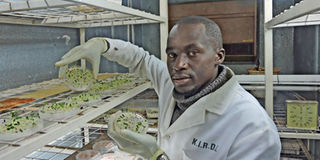I studied the science of seeds

Atege Atei, 25, is a seed scientist. PHOTO | COURTESY
What you need to know:
- I developed a passion for plants’ science and agriculture while in primary school.
- We need to embrace modern ways of irrigation if we are to commercialise farming effectively and achieve food security.
Atege Atei, 25, is a seed scientist. When he arrives at work, the Kenya Agricultural Livestock Research Organisation (KALRO), he heads straight to the gene bank, where he spends most of his time.
Atege, who went to Kisii High School, scored B in the Kenya Certificate of Secondary Education exams, and thereafter joined University of Eldoret, where he studied a bachelor’s degree in Seed Science and Technology. He graduated in 2016.
Why did you choose a course in seed science and technology?
I developed a passion for plants’ science and agriculture while in primary school. Being agriculturalists, my father, Atei Ouya Rioki, and my late mother, Mary Kemunto, taught me why, for instance, I should water a plant’s roots, not its leaves.
My father explained that the roots sapped up water into the plant while leaves acted like a nose, breathing in carbon dioxide for the plant’s food-making process.
This fascinated me - I wanted to know how roots can be a plant’s mouth, the leaves its nose! After high school, I interacted with researchers at a farm that belongs to a family friend, Mr Fanuel Letting, in Uasin Gishu County. Mr Letting encouraged me to take up the course, explaining that agriculture has a great future as the world’s population increases.
Which subjects should one work hard in to be a seed scientist?
Being a science course, you need to do well in mathematics, biology, physical sciences and agriculture.

Seed scientist Atege Atei at work. PHOTO | COURTESY
So, who exactly is a seed scientist?
A seed scientist is basically an expert in the most basic units of plant reproduction, be it through a seed or by vegetative propagation means. I focus on improving seed varieties and farm husbandry practices that can well be adapted to the ever-changing climate in the world. I am currently working in the conservation of genetic resources and also working in the field of biodiversity.
One can work in a wide range of institutions, such as seed companies, seed policy makers and agricultural research centres because they are all involved in the most basic unit of plant production.
How much can one earn as a seed scientist?
Well, this depends on the institution one is working for, though in the public service, pay stands at between Sh70,000 to Sh100,000 a month.
What is the importance of seed science and technology to the economy?
The government has prioritised food security in its Big Four agenda. This can only be achieved if emphasis is put on the most basic aspect, which is the seed. That is how important the course is.
What do you like about the profession?
Although a seed scientist is usually buried in secluded labs researching and examining specimens, his career affects every single person at least once a day during meal times.
Basically, we are involved in feeding mankind. In my view, every seed represents life.
What new things have you learned about your career beyond the classroom?
Each day, my colleagues and I are faced with a myriad of challenges, from new diseases to mutated pests. Our role is to ensure that we offer lasting solutions to these challenges.

Seed scientist Atege Atei at work. PHOTO | COURTESY
How has interacting with older and more experienced professionals impacted your career?
They are the ones I normally look up to whenever I need guidance and encouragement.
I have also had the chance to interact with senior seed scientists and biodiversity experts such as Dr Desterio Ondieki Nyamongo.
You grow tomatoes, spinach and kale (sukuma wiki) in Utawala, an estate in the outskirts of Nairobi’s CBD. What inspired you to consider urban farming?
I believe it is prudent to practice what you preach. I also wanted to be a role model to youth who look down on farming or believe that it can only be done in rural areas. Farming, if done well, pays – I made Sh60,000 in five months, which I used as capital to kick start a project I had longed to execute for a long time.
Unfortunately, lack of water discouraged me from continuing with the project. My experience taught me that we need to embrace modern ways of irrigation if we are to commercialise farming effectively and achieve food security.
How can county governments empower youth to engage in commercial and urban horticultural farming?
This can only be done through education - they cannot embrace farming if they don’t appreciate it. Also, you cannot be successful in farming if you do not have the required information no matter how much money you have.
They should also be offered financial literacy because farming involves a lot of book-keeping. Marketing is also necessary.
Do you have a mentor?
I look up to two people - Mr Bramwel Wanjala of the International Potato Centre and Mr Ivan Obare of the Kenya Plant Health Inspectorate Service (KEPHIS). The two push me to be a better seed scientist.
I also look up to Dr Daniel Chebet, a lecturer at the University of Eldoret, my alma mater, he is always ready to mentor young upcoming farmers.





